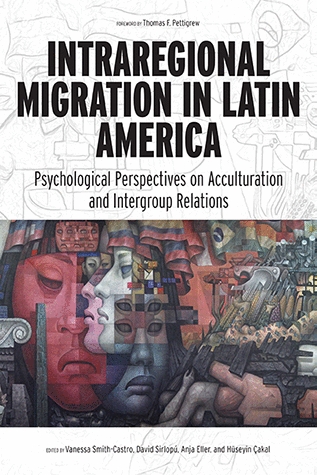Intraregional Migration in Latin America: Psychological Perspectives on Acculturation and Intergroup Relations
30.03.2021, by Tina Keil in publication
Edited by Vanessa Smith-Castro, David Sirlopú, Anja Eller, and Hüseyin Çakal; The American Psychological Association, 2021, 269 Pages; ISBN: 978-1-4338-3380-9

This book addresses the psychosocial causes, consequences, and underpinnings of intraregional migration in Latin America.
War, political instability, and disparities in wealth and opportunity have long driven migration within Latin America, and this process shows no sign of slowing. In this book, cross-cultural and social psychologists address the urgent issues that face migrants throughout Central and South America.
This includes overt prejudice and discrimination, particularly toward immigrants of indigenous or African-American origin; microaggressions; the tendency to positively value fair skin and European surnames; as well as political questions regarding the nature of citizenship and nationhood and links between legacies of colonialism and slavery and present-day inequality.
Contributors offer conceptual, theoretical, and methodological tools for understanding the psychological processes that underlie migration and intergroup contact. Chapters focus on migration between and within countries in Central and South America, including Chile, Argentina, Bolivia, Costa Rica, Mexico, Peru, and Brazil.
Table of Contents
Foreword - Thomas F. Pettigrew
Introduction: Intraregional Migration in Latin America From a Psychological Perspective
Vanessa Smith-Castro, David Sirlopú, Anja Eller, and Hüseyin Çakal
Part I. Intercultural Contact and Acculturation
- South-South Migration in Chile: Well-Being and Intergroup Relations Between Latin-American Immigrants and Host Society Members
María José Mera-Lemp, Gonzalo Martínez-Zelaya, Marian Bilbao, and Aracely Orellana - Acculturation Strategies and Multicultural Identity in Bolivia: Influences of a Plural Society
Eric Roth and Adriana Méndez - Acculturation in International Students in Argentina: Factors That Predict Adaptation
Alejandro Castro Solano and María Laura Lupano Perugini - My Home, My Rules: Costa Rican Attitudes Toward Immigrants and Immigration
Vanessa Smith-Castro, Eugenia Gallardo-Allen, and Mauricio Molina-Delgado
Part II. Intergroup Relations and Social Change
- Exploring Discrimination and Prejudice in Education: Contributions From Social Psychology to the Immigrant Phenomenon in Chile
Natalia Salas, Dante Castillo, David Huepe, Luis Eduardo Thayer Correa, and Felipe Kong - Disadvantage, Contact, and Health Among Indigenous People in Mexico and Chile
Anja Eller, Hüseyin Çakal, and David Sirlopú - Socio-Ideological Beliefs and Perspective Taking Versus the Two-Headed Dragon: A Latin American Prejudice Story, as Told in Argentina
Carlos M. Díaz-Lázaro, Jeremías D. Tosi, Luz M. Castro, and Carolina E. Borgeat-Linares - “What Brings Us Together and Sets Us Apart”: Regional Identities and Intergroup Relations as the Basis of Peruvian National Identity in Samples from Ayacucho and Lima
Rosa María Cueto, Agustín Espinosa, and Harry Lewis - “They Are Close to Us, but We Are So Different From Them”: Prejudice Toward Immigrants and Indigenous Peoples in Brazil
Valdiney V. Gouveia, Rafaella C. R. Araújo, and Taciano L. Milfont
Conclusion: Implications for Future Research
Vanessa Smith-Castro, David Sirlopú, Anja Eller, and Hüseyin Çakal